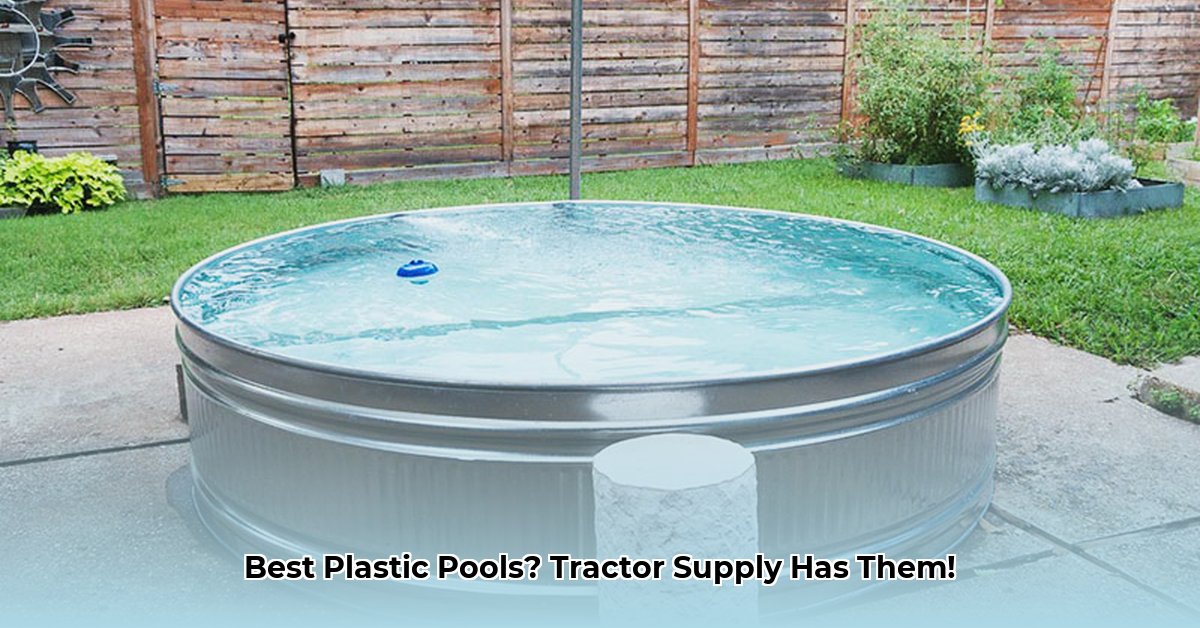
Maintaining a sparkling clean pool shouldn't be a daunting task. Choosing the right cleaning tools can make all the difference, transforming pool maintenance from a chore into a breeze. This comprehensive guide will help you navigate the world of plastic pool cleaners available at Tractor Supply, ensuring you find the perfect fit for your pool's size, your budget, and your lifestyle. We'll cover different cleaner types, provide tips on maintenance and troubleshooting, and ultimately empower you to enjoy more time swimming and less time scrubbing. For more information on Tractor Supply's pool cleaner selection, check out this helpful resource.
Understanding Your Pool's Unique Needs: Choosing the Right Cleaner
Before diving into the specifics of pool cleaners, it's crucial to assess your pool's individual characteristics. Consider its size—a small paddling pool requires a different approach than a large in-ground pool. Think about the typical debris you encounter: Is it primarily leaves, fine sand, algae, or a combination? The ideal cleaner will depend greatly on these factors.
Think of it like choosing the right tool for a job; you wouldn't use a tiny screwdriver to remove large bolts. Similarly, a small, simple pool might only necessitate a basic manual cleaner, while a larger pool with substantial debris will benefit from a more powerful, automated model. This initial assessment is key to making an informed purchase decision.
Types of Plastic Pool Cleaners: A Spectrum of Options
Tractor Supply offers a diverse selection of pool cleaners to cater to varying budgets and lifestyles:
Manual Pool Vacuums: These affordable workhorses provide excellent control and are perfect for smaller pools with minimal debris. They are comparable to a trusty mop, effective but requiring manual effort.
Automatic Pool Cleaners: Powered by your pool's filtration system, these offer hands-free convenience. Ideal for larger pools or busy individuals, they function similarly to a pool-specific Roomba, consistently working without constant supervision.
Robotic Pool Cleaners: These high-end, fully automated systems represent the pinnacle of convenience. Completely independent and efficient, they're the luxury option for effortless pool cleaning.
Choosing the right type depends entirely on your individual needs and preferences. Consider your pool's size, the amount of debris you typically encounter, and your budget.
Key Factors to Consider Before You Buy
Several crucial factors will influence your decision:
| Feature | Considerations |
|---|---|
| Pool Size | Larger pools demand more powerful cleaners. A smaller cleaner will struggle to effectively clean a large pool. |
| Debris Type | Different cleaners excel at handling varying debris. Some efficiently remove leaves, while others tackle fine sand or algae effectively. |
| Budget | Prices range from budget-friendly to premium options. Determine your price range before browsing. |
| Ease of Use | Consider the ease of setup, operation, and maintenance. Some models are considerably more user-friendly than others. |
| Cleaning Cycle | The time needed for a complete cleaning cycle impacts how often you need to deploy your cleaner. |
Maintaining Your Pool Cleaner: Prolonging Its Lifespan
Regular maintenance is essential for optimal performance and longevity. After each use, thoroughly rinse the cleaner to remove all debris. Periodically inspect it for wear and tear, focusing on hoses and connections. Always consult the manufacturer's instructions for specific maintenance advice. Preventive maintenance can save you from costly repairs down the line. Think of it as regular car maintenance—crucial for long-term functionality.
Troubleshooting Common Problems: Quick Fixes for Frustrations
Even the best equipment can encounter occasional problems. Here are some common issues and solutions:
Cleaner not moving: Check for filter clogs, hose kinks or blockages, and ensure the pool pump is functioning correctly.
Poor cleaning performance: A clogged filter is often the culprit. Worn parts may also require replacement. Consult your owner's manual for troubleshooting.
Leaks: Carefully inspect all hoses and connections for leaks. Small leaks are easily repaired; larger ones may necessitate part replacements.
Regular maintenance significantly minimizes the probability of these issues.
Finding Your Perfect Plastic Pool Cleaner: The Final Plunge
The ideal pool cleaner depends on your unique requirements. Consider pool size, debris type, budget, ease of use, and the expected cleaning cycle duration. By carefully weighing these factors, you'll be well-prepared to make an informed decision and enjoy a sparkling clean pool all season long.
Three Pivotal Points to Remember:
- Assess your pool's needs: Pool size and typical debris are crucial for cleaner selection.
- Consider different cleaner types: Manual, automatic, and robotic cleaners offer varying levels of convenience and power.
- Regular maintenance is key: Proper care extends the lifespan and effectiveness of your pool cleaner.